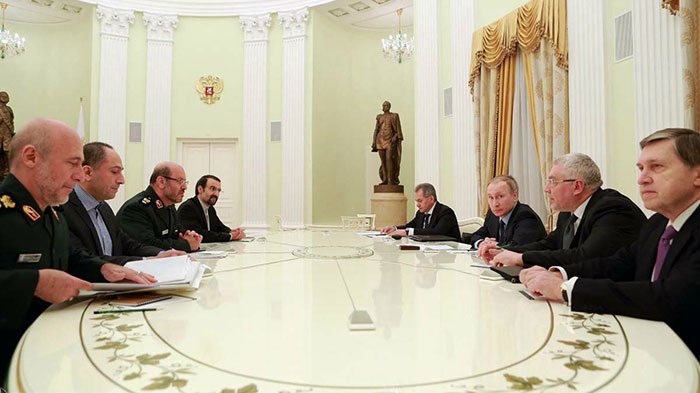What Iran Gains from Military Cooperation with Russia

Iran has given Russian the green to use its territory as a stopover for its bombers to launch raids against ISIS in Syria. The move, unprecedented in the history of Islamic Republic, has prompted up a panoply of critical responses abroad while it is been justified as yet another ground-breaking step in fighting Daesh and putting an end to the Syrian Crisis.
Like the Russian bombers, reports came from outside. Initial elaborations from Tehran immediately led to mixed sensations. Despite an early misunderstanding that took the gesture as Tehran’s allowing a foreign military to control its Shahid Nojeh airbase in Hamedan, northwest of Iran, the response from top Iranian officials implied that it could only be a far-fetched possibility in the future.
The chief of Iran’s supreme national security council, Ali Shamkhani, confirmed the Russian reports. “Tehran and Moscow have strategic cooperation in the fight against terrorism in Syria and we have the capacity and the capabilities for this collaboration,” he said on Tuesday, according to IRNA.
Russia’s long-range bombers, including Su-34 and Tu-22M3 warplanes, have already taken off from near the airbase to target ISIS in Aleppo, according to the Russia’s Defence Ministry.
The cooperation, also a first for Moscow, as it has never used foreign territory for its operations in Syria, enables Russian bomber jets to carry full payloads of 24 metric tons – more than the maximum for the longer run from Russia, notes Pavel Felgenhauer, defence columnist for Novaya Gazeta in Moscow, as quoted by Christian Science Monitor.
Yet another plus for Russia is that its bombers will not need to detour in order to avoid Turkey sky, and will have to fly shorter distances should they strike targets in Iraq.
As for Iran, gains seem to be exaggerated. Although it could been seen a significant step to deepen Iran’s strategic alliance with Russia, the message some observers say is being sent to the regional rivals, including most importantly the Saudi Arabia, is hyperbolized. In a wider scope, one could say Iran is also retaliating what it sees as the slow implementation of the nuclear deal but the point is that the recent cooperation is more a leverage for Russian in its talks with the US.
The US response was merely complaining that they were informed pretty much too late. Russia and the US are currently engaged in Geneva negotiations to start joint military action in Aleppo and restore an overall ceasefire, as U.N. Special Envoy for Syria Staffan de Mistura put it last Thursday. Thus, Iran’s move may be just intended to show the US how firm are Russia and Iran’s determination to help Bashar al-Assad in his fight against terrorist rebels.
The recent episode may help reshuffle other regional alliances, too, tipping the Syrian crisis in favour of Syria. Turkey’s pendulum is once again swing toward the east, for now, as Stratfor has suggested. In the wake of Turkey’s reconciliation with Russia, its shift on Syria and its successful crackdown on the coup, which means and includes its drifting away from the west, Zarif’s visited the country to express support for the Turkish government. The visit was soon paid back by his opposite number Mevlüt Çavuşoğlu’s short unexpected visit, reported to be focused on Syria. Iran’s MFA spox Bahram Ghassemi has implied that these are only beginnings of a series of numerous mutual meetings in the near future, which means further alignment on Syria.
What about the Arabs? Shamkhani slammed Saudi Arabia’s involvement in Syria and Yemen, where the Saudi-led coalition is countering the advances of the Houthi rebels. “It is not acceptable for the Muslim world to see Saudi Arabia investing towards the empowerment of terrorist and Takfiri groups instead of fighting the occupation by the Zionist regime,” SNSC chief Shamkhani said on the day he confirmed the Nojeh reports. But the truth is, Arabs will have nothing to worry about in Kremlin and their differences with Iran over Syria is nothing new, as Iran ex-Ambassador to Azerbaijan suggests in an interview with ILNA. Pessimistic about the presence of Russian bomber jets in Iran, Afshar Soleimani refuses to see the military cooperation as of strategic nature. “If the mutual cooperation were strategic, it would be expanded to other aspects but the Russian do not really want Iran to play a role in Caucasus and Central Asia,” Afshar said.
His idea of Russia is even more cynical as he asks if Iran has gained anything in return. “Russia will use this presence as a leverage. They are now in talks with the US and this gives them an upper hand in the talks and may lead to their deal with the US, which will be detrimental to Iran. In fact, we have given them the option to do so,” he reiterated.
The consensus among top Iranian officials on the move has failed to convince a second layer of decision-makers. At least 20 MPs have called for a closed parliamentary session on Sunday for briefing on the decision. However, Iran’s defence minister Hossein Dehghan has openly put their probe down, saying the Majlis has nothing to do with the military decision.
As Dehghan has explicitly stated, Iran spares no effort to help empower the resistance front in the face of Israel but this partnership of unprecedented nature with Russia has its own opponents in Iran.
Iran’s experimentations with foreign powers prove its wish to redefine its regional status. Just in the same way that the nuclear deal served as a trust test in which the United State has so far failed, the recent military co-op can be yet another lesson for Iran. Tehran has gone far enough to put Russia’s royalty to the test and see what it can gain in return, and it remains a question of time for Iran. For now, fighting terrorism is a priority.

